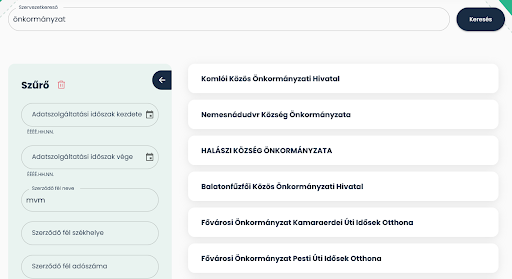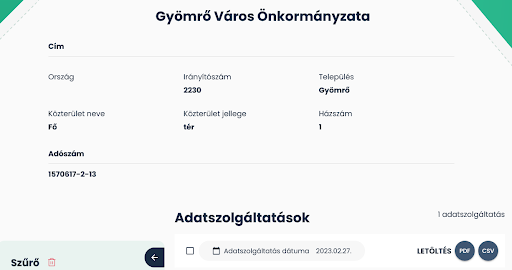Public institutions (budgetary bodies) in Hungary have to publish their contract data from 29 November on through the government's new database on public spending. K-Monitor tested the site and had a devastating experience. Our impression was that the site is designed to be useless and serves the sole purpose of formally fulfilling a commitment towards the EU. The site’s main aim, to help find contract data of the beneficiaries of public funds, remains impossible. Journalists still won't be able to check out contracts of top government crony Lőrinc Mészáros, however users can admire palm trees, pedestrian crossings and speedboats on the website full of captchas.

pic: Prompart
One of the commitments made under the EU's conditionality mechanism was to create a new central repository of contract data, that is publicly accessible and that improves the transparency of public spending. A similar webpage already existed but was not used by anyone.
According to the amendment of the FOI Act last year, budgetary bodies (such as ministries, municipalities, public authorities) will have to publish their data on contracts (e.g. procurements, grants) worth over HUF 5 million through a new interface, the so-called Central Information Public Data Registry. Publishing these data was already mandatory, but the institutions uploaded them on their own websites. The idea behind the database was based on the concept of central contract repositories, such as those that Slovakia and the Czech Republic have been maintaining for almost ten years. There the publication of contracts is a condition for their entry into force (exceptions of course exist).
The new Hungarian database is a far cry from this, as the contracts themselves do not have to be published, only their main details. In fact, the scope of publication is narrower than it should be. For example, it does not include all those bodies that perform public tasks but are not budgetary bodies - although the Act on Freedom of Information does apply to them, such as public interest trusts managing assets worth thousands of billions.
In principle, if a data holder fails to disclose its contracts, it could face a fine of up to HUF 50 million [EUR 125k] if it fails to do so within 15 days despite a notification from the Hungarian National Authority for Data Protection and Freedom of Information (NAIH). The law also requires, in principle, that the site should allow for machine readability, group downloading, grouping, searchability, extraction and comparability of data.
Data collection is done in a haphazard manner, with data providers having to submit their data every two months via an excel sheet, rather than generating these statements in real time from electronic records of the government or the institutions. This is extra work and a significant error factor.
Why is the site unqualifiedly lousy?
- Data are only available in separate bimonthly pdf files per institution and cannot be processed by machine.
- It is not possible to search for beneficiaries or contractors of budgetary bodies.
- Institutions do not have a unique ID to prevent incorrect transmission of data (e.g. typos).
- Entities in the database cannot be listed, they do not have their own linkable page with all the contracts they are subject to.
- It is not possible to download the whole database in raw form for analysis, the page generates one csv file per disclosure, but as it is comma-separated and the text is comma-separated it is not possible to generate a normal analysable table from it.
- The portal makes it difficult to access data with unnecessary captchas and an illogical structure.
Can we find contracts of government crony Lőrinc Mészáros in the database?
Let’s test the site and see some basic use cases: How difficult is it to find the company of Lőrinc Mészáros, close associate of PM Orbán, which was awarded hundreds of billions in public procurement contracts?
Despite the limitations of the concept, something good could have come out of the initiative, such as listing all the contracts concluded with Mészáros and Mészáros Zrt. by various budgetary bodies. Nobody should get their hopes up, because the site only allows direct searches for the institutions that have provided data, not for those with whom they have contracted.
Let's look up something else and see what we can find by searching for municipalities in the database. Since there was no results for Lőrinc Mészáros in the municipal contracts, we filtered on Hungarian energy company MVM, which is likely to supply gas or electricity in many places:

List of results after searching or “municipality”
As of the morning of 28 February, there are roughly 400 municipalities listed on the site, the number of results is not shown on the site (there are 3155 municipalities in total). The results appear in a completely random order and they cannot be sorted either. To find out what kind of contract a municipality had with MVM, you have to go through the municipalities individually, essentially like going to their website. Only then do you get to the point where you can download the document (PDF or CSV) containing the data on the contracts of the data owner for a given period. Of course only after you have again ticked all the images with mountains in the captcha.

The page of the Municipality of Gyömrő
After opening the document, for the first time, we encountered data on contracts.

Rows containing data about the municipality's contracts with MVM
We were lucky that Gyömrő was on the first page of the results list, because we didn't even see any downloadable data for the municipalities on the second page:
 The page of the municipality of Tiszaújváros. The search results in a text saying “The selected organization does not have data matching the search criteria.”
The page of the municipality of Tiszaújváros. The search results in a text saying “The selected organization does not have data matching the search criteria.”
If we had wanted to direct our readers to the page using links rather than screenshots, we would have been wasting our time, the entities on the page do not have their own links. In this way, the government was able to produce an even weaker disclosure of data than the data hosts' own website, where you could at least see all their contracts in one place, as in the case of the Municipality of Budapest's own website (which is linkable!):

Contracts listed on the website of the Municipality of Budapest
But let's go back to the public data registry to see if we can find Mészáros and Mészáros Zrt.!
This time we searched among the ministries for contractors with headquarters in Felcsút on the afternoon of 28 February. Unfortunately, we can't do this among all the institutions above. We have to filter on at least 3 letters and can only search among the results. The ministries are also not all listed in the database: several were missing after the deadline (Ministry of Finance, Prime Minister's Office).
Only the Ministry of Defence has a result, which is the Puskás Academy, a football academy from Felcsút. It took eight steps to get here from opening the database including searching through the 27-page PDF of the Ministry of Defence. And it's only going to get worse over time, with a new PDF/CSV for each data provider every two months, and these will have to be combed through one by one. Not to mention when a data provider uploads a separate file per subject, like the Foreign Ministry:

The page of the Ministry of Foreign Affairs and Trade
But even so, it is not certain that everything will be found, all it takes is for a data owner to misspell his name and the data for a given period can easily disappear in the repository. For example, the inhabitants of Nemesnádudvar search in vain for their municipality on the portal.

The Municipality of Nemesnádudvar, with a typo in the name
Will this be enough to convince the EU?
Obviously, when the site was created, no consideration at all was given to the perspective of those who work with public data on a daily basis.
The site illustrates well the seriousness and credibility of the government's anti-corruption commitments. Beyond wasting money, the public data register in its current form is completely pointless, and offers nothing beyond what had to be disclosed on the data holders' own websites. In some cases it makes it even more difficult to find information. This will be particularly inconvenient if data providers will no longer upload the necessary information to their own websites at the same time as using the new site. It would have been cheaper and more useful if the Freedom of Information Authority (NAIH) had been simply empowered to penalize data providers who do not put their contractual data on their website.
The creators of this outrageous database cannot say K-Monitor didn't warn them. In the public consultation on the relevant regulation, we explained in detail what would be needed to make the public data register of any real use. For example, to have a separate, linkable page for each entity, to have the full content of the page available as a raw database, or to generate statistics from the data recorded in the register. This may have been a mistake, because seemingly the creators of the database made sure to avoid all these features. The Prime Minister's Cabinet Office then brushed aside our proposals, saying that the technical details were 'beyond the scope of the regulation', as the document under review 'implements a decision of the Government'.
.
If you found this post useful,
Support K-Monitort with a donation!
Címkék: english EU conditionality
Szólj hozzá!
A bejegyzés trackback címe:
Kommentek:
A hozzászólások a vonatkozó jogszabályok értelmében felhasználói tartalomnak minősülnek, értük a szolgáltatás technikai üzemeltetője semmilyen felelősséget nem vállal, azokat nem ellenőrzi. Kifogás esetén forduljon a blog szerkesztőjéhez. Részletek a Felhasználási feltételekben és az adatvédelmi tájékoztatóban.





